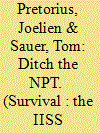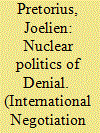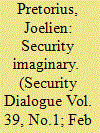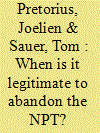| Srl | Item |
| 1 |
ID:
179827


|
|
|
|
|
| Summary/Abstract |
Without the Nuclear Non-Proliferation Treaty, nuclear-armed states and their allies could no longer rely on their skewed interpretation of it to legitimise continued possession of nuclear weapons.
|
|
|
|
|
|
|
|
|
|
|
|
|
|
|
|
| 2 |
ID:
123691


|
|
|
|
|
| Publication |
2013.
|
| Summary/Abstract |
AbstractSouth Africa was one of the first states to conclude an Additional Protocol with the International Atomic Energy Agency (IAEA) in 2002, allowing the IAEA greater right of access to safeguard nuclear activities and material. In light of this, some observers in the arms control community find it odd that South Africa's representatives at the Nuclear Suppliers Group (NSG) would be the main objectors to making the conclusion of an Additional Protocol a precondition for states wishing to import uranium enrichment and reprocessing technology (classified as sensitive nuclear technology and material). The South African objection should be viewed as only the most recent in a series of objections to measures that may seem obviously in line with nuclear non-proliferation. This emerging pattern in South Africa's nuclear diplomacy and, more specifically, the objection to the Additional Protocol condition are related to its membership in the Non-Aligned Movement (NAM) and can be investigated through the lens of a politics of denial. Denial is the act of saying "no", but it is also in psychological parlance the unconscious thought process manifesting a refusal to acknowledge the existence of certain unpleasant aspects of external reality. It will be argued that South Africa's opposition to the Additional Protocol condition can be explained in the context of two instances of denial: (i) a perceived denial by the nuclear haves of what the Nuclear Non-Proliferation Treaty codifies as an inalienable right to peaceful nuclear technology - something that South Africa is cautious to be complicit in; and (ii) the nuclear weapon states' denial (the psychological meaning) of the unpleasant reality of a hypocritical nuclear order - something that South Africa wants to expose or at least something with which to engage to limit the effects for itself and other NAM members. The politics of denial does not yield to a pragmatist/utopian dichotomy in the nuclear realm, but instead reveals the dialectic nature of realism and idealism in nuclear politics, especially as reflected in South Africa's nuclear diplomacy.
|
|
|
|
|
|
|
|
|
|
|
|
|
|
|
|
| 3 |
ID:
134606


|
|
|
|
|
| Summary/Abstract |
The traditional arms control approach is slow in dismantling nuclear arsenals. It is also a state-centered approach, and does not enthuse public opinion as it is rather technical and complex. The recent interest in the so-called humanitarian approach of nuclear disarmament can be explained by a growing frustration with traditional arms control. The humanitarian approach points to the consequences of the use of nuclear weapons for individual human beings, and recommends forbidding nuclear weapons. The step-by-step approach is replaced by a principled approach, which holds that nuclear weapons are too destructive to be used, just like chemical and biological weapons. A ban on nuclear weapons will turn the tables. The burden of proof will shift from the non-nuclear weapon states to the nuclear weapon states. Those nuclear weapon states that are not eager to eliminate their nuclear weapons will come under growing pressure from worldwide public opinion as well as their own public opinion. It is this stigmatizing effect of nuclear weapons as inhumane and therefore unusable that may bring all states to pursue Global Zero.
|
|
|
|
|
|
|
|
|
|
|
|
|
|
|
|
| 4 |
ID:
080873


|
|
|
|
|
| Publication |
2008.
|
| Summary/Abstract |
This article proposes the notion of a security imaginary as a heuristic tool for exploring military isomorphism (the phenomenon that weapons and military strategies begin to look the same across the world) at a time when the US model of defence transformation is being adopted by an increasing number of countries. Built on a critical constructivist foundation, the security-imaginary approach is contrasted with rationalist and neo-institutionalist ways of explaining military diffusion and emulation. Merging cultural and constructivist themes, the article offers a `strong cultural' argument to explain why a country would emulate a foreign military model and how this model is constituted in and comes to constitute a society's security imaginary
|
|
|
|
|
|
|
|
|
|
|
|
|
|
|
|
| 5 |
ID:
185998


|
|
|
|
|
| Summary/Abstract |
Treaties can be denounced and withdrawn from unilaterally and collectively. We ask when it would be legitimate to abandon the NPT, a treaty that 50 years ago committed states to nuclear non-proliferation and disarmament, but still has not delivered on the latter. The end of the NPT is a taboo subject in the arms control community that sees it as the cornerstone of the nuclear order. We draw on literature on the legitimacy of and exit from international institutions. We especially explore the political substance of the discontent that the non-nuclear weapons states have expressed in and outside the NPT forum. Exiting the NPT can legitimately be used as a political tool to challenge the current status quo where five states claim a right to possess nuclear weapons based on the NPT, and to achieve a nuclear order where nuclear weapons are illegal for all.
|
|
|
|
|
|
|
|
|
|
|
|
|
|
|
|